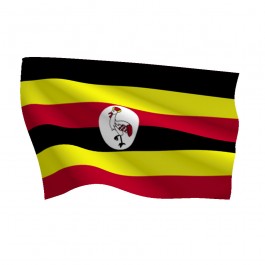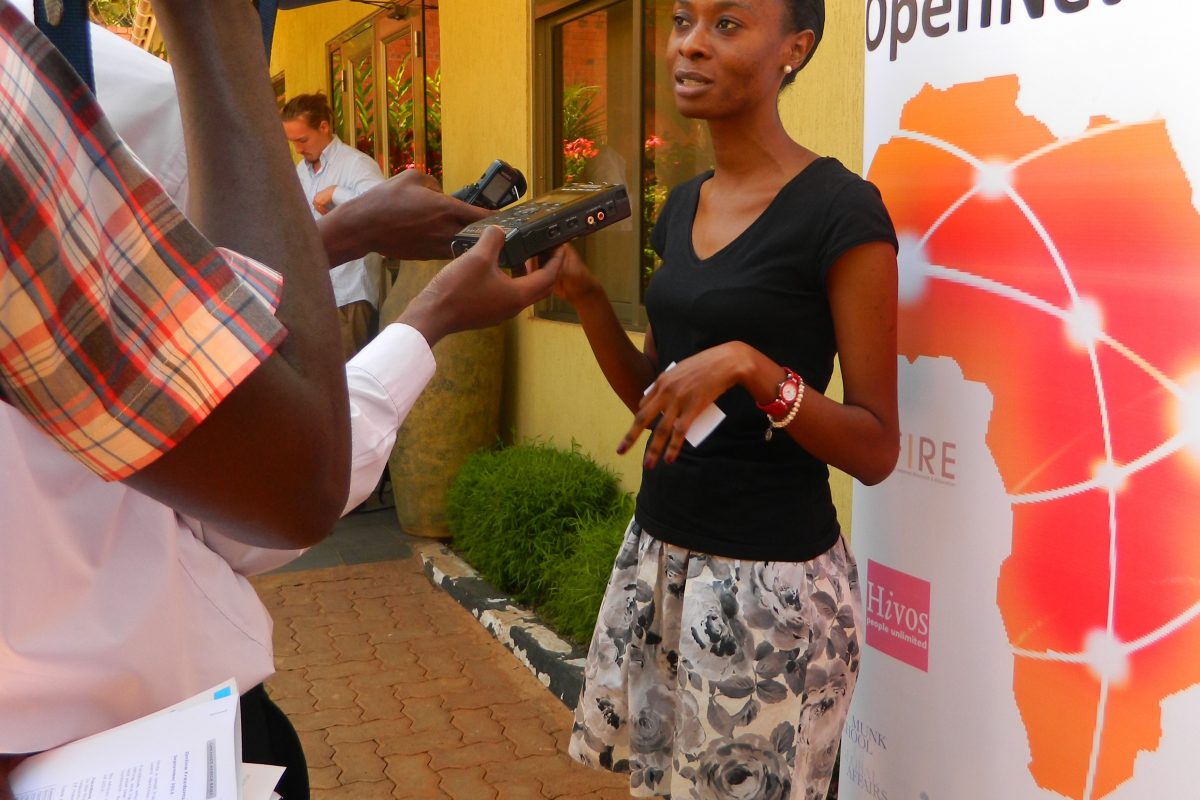By Emily Mullins
In early July, the Collaboration on International ICT Policy in East and Southern Africa (CIPESA) met with members of the Northern Uganda Media Club (NUMEC) to discuss the Peace Recovery and Development Project (PRDP). First launched in October 2007, the PRDP sought to improve livelihoods in post-conflict Northern Uganda. Its stated objectives were to consolidate state authority, rebuild and empower communities, revitalise the economy, and to promote peace and reconciliation.
Individual projects to achieve these objectives included enhancing the rule of law, providing equipment and logistics to strengthen law enforcement, build and staff health centres, schools, and building roads, bridges, and market facilities. The plan also claimed that in the process, it would prioritise according to the concerns of the communities within which it was working.
To date, many feel that the ambitious program has not lived up to its hype and has instead been in a state of ongoing corruption and mismanagement of funds. NUMEC members presented cases of mismanagement and poor oversight, leading to devastating results. In particular, many of the contractors who were awarded construction projects implemented sub-standard work, with structures and roads crumbling after only a few years of use. NUMEC cited one example of a health centre that functioned as no more than an abandoned home once winds blew off the poorly constructed roof.

In other cases, contractors simply did not finish the project, cashing their cheques and abandoning the communities with half-built structures. In one such case, teachers at a PRDP-funded school are still living in overcrowded and poorly sanitised conditions, four years after permanent lodging was supposed to be built. One problem is that there is little or no accountability and oversight on these projects.
Another problem has been that of visibility. One reporter noted that citizens have difficulties knowing which programs are part of PRDP and which are non-PRDP development initiatives. The PRDP does not adequately advertise its proposed projects, so citizens may not even be aware that they should be expecting a service. When citizens are unaware of what promises the government is making to them, they have no reason to be upset when said services never appear. It leaves the government unaccountable for its actions, and wastes public funds. Without transparency on proposed projects, the people have no way to demand accountability.
The increased pushes for open data have, however, helped. For example, the PRDP has a website on which the Office of the Prime Minister – the initiative’s coordinating office – publishes budgets, workplans and reports. However, the danger in such pushes for “transparency” is that it can allow for complacency. Having marked the check box for open data, the government can avoid true accountability. Not all citizens posses the technological skills or resources to access the data and understand it. For many, the information might as well be in a different language, and in the most rural areas, where use of the English language is not as widespread, it is.
This is where the media can come in. The media serves as an intermediary between the government and the people. When the government provides the information, the media ought to have the tools to interpret the data, and turn it into something meaningful for its consumers. While rural populations may not have consistent access to the internet or social media, journalists have the opportunity to take the information from such sources and transmit it through more ubiquitous technology, such as print and radio.
With the availability of new technologies like geospatial analysis and infographics come new opportunities to tell simple, yet powerful visual stories with the data. Providing citizens with information empowers them to make better demands from public officials. As one journalist noted, “even if major news sources do not want to pick up a story, if the social media and grassroots sources generate enough buzz, they force the story to the forefront.”
This is not to say that the media should only focus on watchdogging. Reports on failures or mismanagements are important, but if the media only concentrates on the negative surrounding PRDP, it risks disengaging the public. For the public to be actively engaged, it needs to believe in the capacity for PRDP to succeed, and it especially needs to believe that its voice will be heard and that administrators will be responsive to demands. This necessitates, then, that the media seek out and also report on success stories. A hope for improvement is just as necessary to transparency as the recognition of failures.
The PRDP has the potential to help shape Northern Uganda’s recovery process, but it requires diligence from the government, the media, and citizens. It is within the power of citizens to force accountability from the government, but only if they have the right information. This is where the media can make a difference: by taking the data provided by the government, and making it relevant for the people, the media can keep the public eye on PRDP projects, both for its success and its shortcomings. The tools are there, it is only a matter of using them.
Members of NUMEC received training on the use of geospatial analysis tool, ArcGIS carried out by AidData Summer Fellow Emily Mullins who was stationed at CIPESA during June – August 2014. She holds a Masters in International Affairs from the George Bush School at the Texas A&M University, USA.
Uganda: When National Security Trumps Citizens’ Internet Freedoms
The Ugandan telecommunications sector was liberalised in 1998, resulting in an influx of service providers – there are currently four major mobile telecom operators and more than 30 Internet Service Providers (ISPs). The establishment of a Uganda Internet Exchange Point (UIXP) allows for local internet traffic routing, increased speeds and lower costs. The regulatory body reports a teledensity of 52 phones per 100 inhabitants and an internet penetration rate of 20%.
Ugandans have embraced social media as an alternative means of communication with their peers as well as for engaging with government. This is seen in the increase in the popularity of social networking sites such as Facebook, Twitter, LinkedIn, Youtube and Blogspot, which are ranked among the top 10 most visited websites in Uganda. As such the government has developed social media guidelines to aid its ministries, agencies and departments in communicating and engaging with citizens online.
However, as the telecommunications sector grows, so have the number of laws passed to regulate it. Some of these laws have drawn criticism from internet actors both locally and internationally due to their severity, infringement on human rights and contradictions with other existing legislation, including the constitution.
“No person shall be subjected to interference with the privacy of that person’s home, correspondence, communication or other property.”
Article 27 (2) of Ugandan Constitution
The use of ICTs in Uganda is threatened by the very laws that are meant to both protect citizens and ensure their rights. The Regulation of Interception of Communications Act, 2010, the Anti-Terrorism Act No.14 of 2002, the Anti-Pornography Act of 2014 and the Anti-Homosexuality Act of 2014 have undercurrents of surveillance, content filtering, and monitoring.
Although these laws are guised under provisions aimed to protect national security or fight cybercrime, in effect they may serve to silence voices critical to the state. Ultimately, these provisions are resulting in self-censorship by both ordinary online users and the media.
Provisions in the Electronic Transactions Act of 2011 limit the liability of ISPs for users’ content and do not require them to monitor stored or transmitted data including for unlawful activity. However, other laws place ISPs at a cross roads of service provision and protection of subscriber information. They are required to lawfully release users’ data to state agencies for purposes such as fighting terrorism and cybercrime. Moreover, the Anti-Pornography Act (2014) requires them to monitor, filter and block content of a pornographic nature.
In the absence of a data protection and privacy law, just like other countries in East Africa (State of Internet Freedom in East Africa), users’ data is vulnerable to mishandling and abuse by the state and ISPs. These vulnerabilities are also transferred to the offline world where freedom of expression and assembly have not been spared as seen in the limiting provisions under the Public Order Management Act, 2013.
It should be noted that the Ugandan government recently announced plans to draft a Data Protection and Privacy Bill. This is a positive step toward the protection of personal information and its use by the government and the private sector.
Read more in the 2014 Internet Freedom in Uganda Report prepared by CIPESA under the OpenNet Africa initiative. The report provides a status of the legislative environment and threats to internet freedoms in the country.
New Laws in Uganda Restrict Citizens’ Rights
By Juliet Nanfuka
Recently introduced laws and regulations in Uganda have caused a stir both within the country and internationally for restricting citizens’ rights to freedom of expression on the internet and offline.
The most contentious of these are the Anti-Pornography Act 2014, the Public Order Management Act 2013, the Anti-Homosexuality Act 2014, the 2014 Press and Journalist regulations and the Non Government Organisation (NGO) Amendment bill. They are criticised for creating unwarranted restrictions to liberties granted by the country’s 1995 constitution.
As a result, the space in which civil society, the media and citizens can enjoy constitutionally granted rights to freedom of expression, opinion, assembly, and information is steadily shrinking.
In an April 2014 brief, CIPESA takes a look at how the recently enacted laws and proposed amendments impact on citizens’ rights, including internet rights, as well as on the work of human rights defenders. Read the full brief here.
Internet Rights in Uganda: Challenges and Prospects Workshop Report
The Collaboration on International ICT Policy in East and Southern Africa (CIPESA, www.cipesa.org) in conjunction with Unwanted Witness Uganda (www.unwantedwitness.or.ug) on November 28, 2013 organised a workshop on promoting internet rights in Uganda. The workshop aimed to create awareness among civil society, netizens, and the media in Uganda on how policy and practice affect internet freedoms in the country. The workshop also sought to draw up strategies for network building and advocacy to promote and protect online freedoms in Uganda.
Download the workshop report here.
Internet Freedom: Should Africa Prioritise Access or Security?
By CIPESA Writer in Stockholm
An interesting conversation is taking place in the Swedish capital Stockholm. At the Stockholm Internet Forum (SIF), which is being watched online by audiences around the world, a journalist with Uganda’s Daily Monitor newspaper asked a question that is central to much of the debate here. Should people in his country be concerned about the so-called internet rights when majority of them do not even have access to the internet, and when big numbers of them lack access to clean water? As the journalist addressed a global audience of online rights activists, back home his newspaper, the two radio stations it runs, and another independent newspaper (The Red Pepper), remained shut down for a fourth day. Under the guise of searching for a document allegedly authored by the head of Uganda’s intelligence services, which President Yoweri Museveni’s government deemed a threat to national security. The police ransacked and cordoned off the media houses. Their computers and servers were being searched; the radio transmitters switched off despite a court order for the security agencies to vacate the media premises.
However, his concerns rhyme with concerns from other participants at the forum. Questions such as, should developing countries prioritise giving access to the internet to more of their citizens or should they instead dwell on improving security and privacy for current internet users?, were at the center of the discussions.
For many of the participants from Africa who spoke to CIPESA, access to the internet remains a key concern on the continent. Only a fraction of people on the continent are users of the Internet (estimated at 15% of the continent’s population). But user numbers are rising fast, driven by increased availability of affordable marine fibre optic bandwidth, a rise in private sector investments, the popularity of social media and innovative applications, not forgetting an increased use of the mobile phone to access the internet.
But as more Africans are getting online, more African governments are moving to curtail online freedoms using both legal and non-legal means. The pity, said the African observers, was that there was little understanding in African countries of the need to protect and to promote these internet rights and freedoms. More so, in most countries there were few actors talking about these matters and creating awareness about the citizens’ right to seek, receive and impart information and ideas through digital technologies.
But back to the question: should African countries priorities access or security? “It is important when you talk of the internet not to think of it chronologically,” said Ross LaJeunesse, Global Head of Free Expression and International Policy at Google. “The internet as we know it is supposed to be free and open… you would be doing a disservice to people if you offer it otherwise.” Anja Kovacs of the Internet Democracy Project in Delhi, India, agreed: we do not need to get everyone online before we start thinking of making it secure for people to be on the internet. “Security has to come at the same time as access,” said Kovacs.
Protecting internet freedoms is becoming of growing interest to academics, human rights activists and media worldwide, including in developed countries, where some governments are using the excuse of fighting cybercrime to limit citizens’ online freedoms. Ron Deibert, head of the Citizen Lab at the University of Toronto, Canada, has led a 10-year research into this issue, and on Tuesday, May 21 launched a well-received book, Black Code in which he contends that the internet’s original promise of a global commons of shared knowledge and communications is now under threat.
Intelligence agencies that were less accountable are taking over aspects of monitoring internet freedoms. Meanwhile, citizens are placing a growing amount of data into the hands of private companies which are increasingly being asked to monitor the internet. Worryingly too is that most of the new users are coming from countries with fragile democratic systems, where internet rights could more easily be trampled.
These concerns/fears are also being investigated by CIPESA under the OpenNet Africa Project. The project is monitoring internet freedoms in a number of African countries such as Ethiopia, Kenya, Rwanda, South Africa and Uganda. We are documenting internet rights violations and reviewing cyber security policies and legislations in these countries to see how they enhance, or undermine, internet freedom.
More on SIF: http://www.stockholminternetforum.se/
Follow on twitter: @sif13





